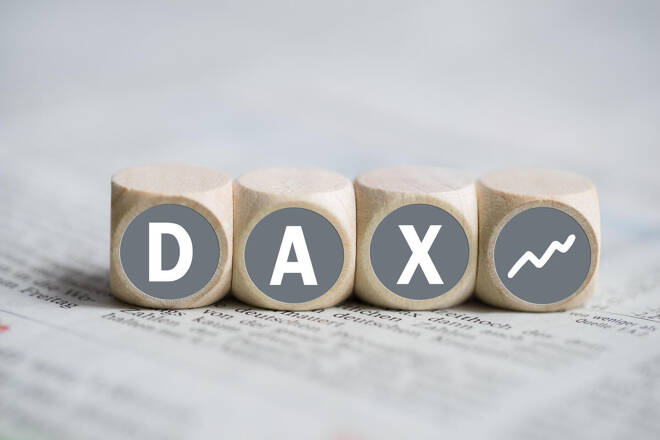Advertisement
Advertisement
DAX Index: DAX Stocks on Edge as German Economy Stalls and China Acts
By:
A bullish start to the European session as DAX futures rise, despite rising German recession expectations and global economic uncertainty.
Highlights
- DAX recovered partially from a 0.68% loss, ending the week up 0.37% despite economic indicators fueling recessionary fears in Germany.
- China measures to support its markets, including cutting stamp duty on stock trading, drove demand for riskier assets this morning.
- Bullish start to the European session as DAX Futures rose 87 points despite global economic uncertainties.
Friday Session Overview
On Friday, the DAX gained 0.07%. Partially reversing a 0.68% loss from Thursday, the DAX ended the week up 0.37% to 15,632.
While the hawkish Fed Chair Powell speech tested buyer appetite, bets on the ECB hitting the brakes on interest rate hikes provided support. Economic indicators from Germany fueled recessionary jitters on Friday, capping the upside.
The German economy stalled in the second quarter, with the German Ifo Business Climate Index suggesting conditions will worsen. The Ifo Business Climate Index fell from 87.4 to 85.7 in August. Notably, sentiment also deteriorated, aligned with the latest private sector PMI survey.
In August, the German Business Expectations Index fell from 83.6 to 82.6. Economists expected business expectations to improve.
While Powell left the door open for more rate hikes, ECB President Christine Lagarde provided some comfort. The ECB President considered euro area inflation and the economy to remain aligned with the June forecasts. Significantly, the ECB President predicted a very different inflation backdrop by year-end.
On Friday, the NASDAQ gained 0.94%, with the Dow and S&P 500 ending the day up 0.73% and 0.67%, respectively.
Friday’s Market Movers
The auto sector had a mixed end to the week. Continental AG declined by 1.43%, with BMW falling by 0.28%. Porsche and Volkswagen saw modest losses of 0.02% and 0.07%, respectively. Mercedes-Benz Group bucked the trend with a 0.01% gain.
However, bank stocks struggled. Commerzbank and Deutsche Bank fell by 0.56% and 0.30%, respectively.
Continental was among the worst performers, with investors locking in recent profits on restructuring news as demand fears lingered.
China and Central Banks Remain the Focal Points
We expect the DAX to take its cues from the Asian equity markets this morning. Fresh measures from Beijing drove demand for riskier assets. Beijing announced plans to cut stamp duty on stock trading. The latest move follows measures on Friday to bolster the housing market, including relaxing mortgage policies to shore up demand.
China Evergrande Group (HK333) resumed trading on the Hang Seng Index to test investor resolve. China’s economic troubles will also leave investors cautious ahead of key economic indicators from the US, Europe, and China. China Evergrande Group was down 78.5% in morning trading. However, investors brushed aside the slump on Beijing efforts to support the markets.
There are no economic indicators from Germany or the Eurozone to influence investor sentiment.
Later in the session, the Dallas Fed Manufacturing Index will unlikely affect sentiment. However, investors should monitor ECB and Fed commentary throughout the day. Hawkish central bank chatter would test buyer appetite amidst the rising expectations of a German recession.
The DAX Futures was up 87 points, signaling a bullish start to the European session.
DAX Technical Indicators
The DAX held above the 15,600 – 15,525 support band this morning. However, the DAX sat below the 50-day and 200-day EMAs, sending bearish near and longer-term price signals.
Looking at the 14-4H RSI, the RSI sits at 43.56, reflecting a bearish sentiment, with selling pressure overweighing buying pressure. Significantly, the RSI and the EMAs signal a retreat through the upper level of the 15,600 – 15,525 support band to target sub-15,000. A return to 15,700 would give the bulls a run at the 50-day EMA.
For a look at the economic events, check out our economic calendar.
About the Author
Bob Masonauthor
With over 28 years of experience in the financial industry, Bob has worked with various global rating agencies and multinational banks. Currently he is covering currencies, commodities, alternative asset classes and global equities, focusing mostly on European and Asian markets.
Advertisement
